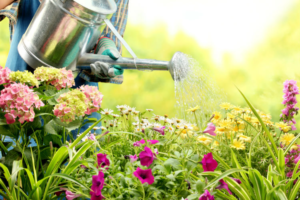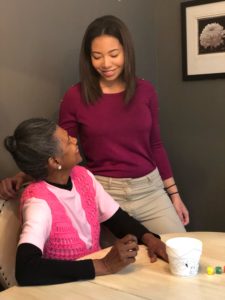Have Fun – Enjoyable Activities for Older Adults
As you grow older, some of the things you have always loved to do become more difficult than they ever were before. This is a challenging part of aging but something you should keep in mind is, there are lots of appealing and valuable things you can do to improve your health and attitude. Below is a list of activities and hobbies that are sure to keep you entertained as you age.

Birdwatch
One popular activity is birdwatching. Birdwatching exercises both your mind and your body. It is a wonderful way to get outside and active. Another great thing about birdwatching is that it is one of the most affordable activities there are. All you need is a field guide and maybe a pair of binoculars!
Get to Cooking
Most people have been cooking and baking for years. Many do not realize that cooking and baking can have a good effect on your mental health. Cooking stimulates your senses, it makes you (and whoever you are sharing with) happy, and it can be an outlet to express creativity. If you are searching for an activity to take part in, you may want to dive into an activity you have known all your life and head to your kitchen!
Start a Garden
Gardening is an activity that is beneficial both mentally and physically. It improves your me mory and attention span, lowers stress, and boosts the feeling of relaxation. When gardening, you are adding to the beauty of your surroundings. You may even be putting food on the table in the process, depending on what you choose to plant. Gardening is an activity you do not have to wait to begin. All you need to start your garden is some land, and seeds from your neighborhood home shop.
mory and attention span, lowers stress, and boosts the feeling of relaxation. When gardening, you are adding to the beauty of your surroundings. You may even be putting food on the table in the process, depending on what you choose to plant. Gardening is an activity you do not have to wait to begin. All you need to start your garden is some land, and seeds from your neighborhood home shop.
Go for a Walk
One of the best ways to get some exercise and take in the beauty of nature is, going on a walk. Walking helps preserve mobility and independence as you age. It is a low impact activity, where even something as simple as taking a stroll through the park can help keep you in shape.
Draw or Paint
Painting and drawing are some hobbies you could incorporate into your everyday life. Not only is painting and drawing peaceful activities and a lot of fun, but there are many other benefits that you can enjoy if you make it your new hobby. Painting and drawing help to enhance fine motor skills, increase brain activity, and work on concentration. All you need is paper and a pencil! If you feel you would like some more professional art tools, you should be able to get all you need and more at your local craft store.
Do What You Love
Doing the things that you love will help you to live a happy and healthy lifestyle. All the activities listed are great opportunities for you to exercise your brain, body, and heart. By becoming more active, you will find more enjoyment in your free time. So come on, have fun, and get active!


 genetics plays a part in health during old age, one important thing that affects your health is how you’ve lived throughout your younger years. If you smoked, the consequences in later life have a chance of being lung cancer, COPD (chronic obstructive pulmonary disease), heart disease or even vision loss. Poor diet is an additional cause of poor health in the elderly. Overeating can cause diabetes, heart problems, and many other illnesses. Many cannot afford to eat properly, still, even if it is within their means, some disregard the importance of keeping a proper diet. This makes them far more susceptible to disease. There are many things you can do to take care of your health while you grow older. Eat smart, the digestive system slows down with age, so eating foods high in fiber would be a good thing to do. Seniors can more easily become dehydrated. Make sure to drink plenty of water to keep your energy up. Always get enough sleep. This can be difficult with restlessness and waking throughout the night which is common among seniors. What can help? Dimming the lights in the evening will encourage drowsiness and keep your bedroom cool, quiet and comfortable. This can help provide you with an atmosphere whereby you can sleep more peacefully.
genetics plays a part in health during old age, one important thing that affects your health is how you’ve lived throughout your younger years. If you smoked, the consequences in later life have a chance of being lung cancer, COPD (chronic obstructive pulmonary disease), heart disease or even vision loss. Poor diet is an additional cause of poor health in the elderly. Overeating can cause diabetes, heart problems, and many other illnesses. Many cannot afford to eat properly, still, even if it is within their means, some disregard the importance of keeping a proper diet. This makes them far more susceptible to disease. There are many things you can do to take care of your health while you grow older. Eat smart, the digestive system slows down with age, so eating foods high in fiber would be a good thing to do. Seniors can more easily become dehydrated. Make sure to drink plenty of water to keep your energy up. Always get enough sleep. This can be difficult with restlessness and waking throughout the night which is common among seniors. What can help? Dimming the lights in the evening will encourage drowsiness and keep your bedroom cool, quiet and comfortable. This can help provide you with an atmosphere whereby you can sleep more peacefully. rt. We should look for ways to help conserve the dignity of our maturing parents. For example, being a good listener will keep us from insisting on doing things our way without considering their opinions. They need to feel appreciated, and that their lives are still worth living. Show your parents you love them. If they aren’t living with you, remember that your keeping in contact can mean a lot to them. Write them a letter, give them a call, or stop by for a visit. This will bring them so much happiness.
rt. We should look for ways to help conserve the dignity of our maturing parents. For example, being a good listener will keep us from insisting on doing things our way without considering their opinions. They need to feel appreciated, and that their lives are still worth living. Show your parents you love them. If they aren’t living with you, remember that your keeping in contact can mean a lot to them. Write them a letter, give them a call, or stop by for a visit. This will bring them so much happiness.